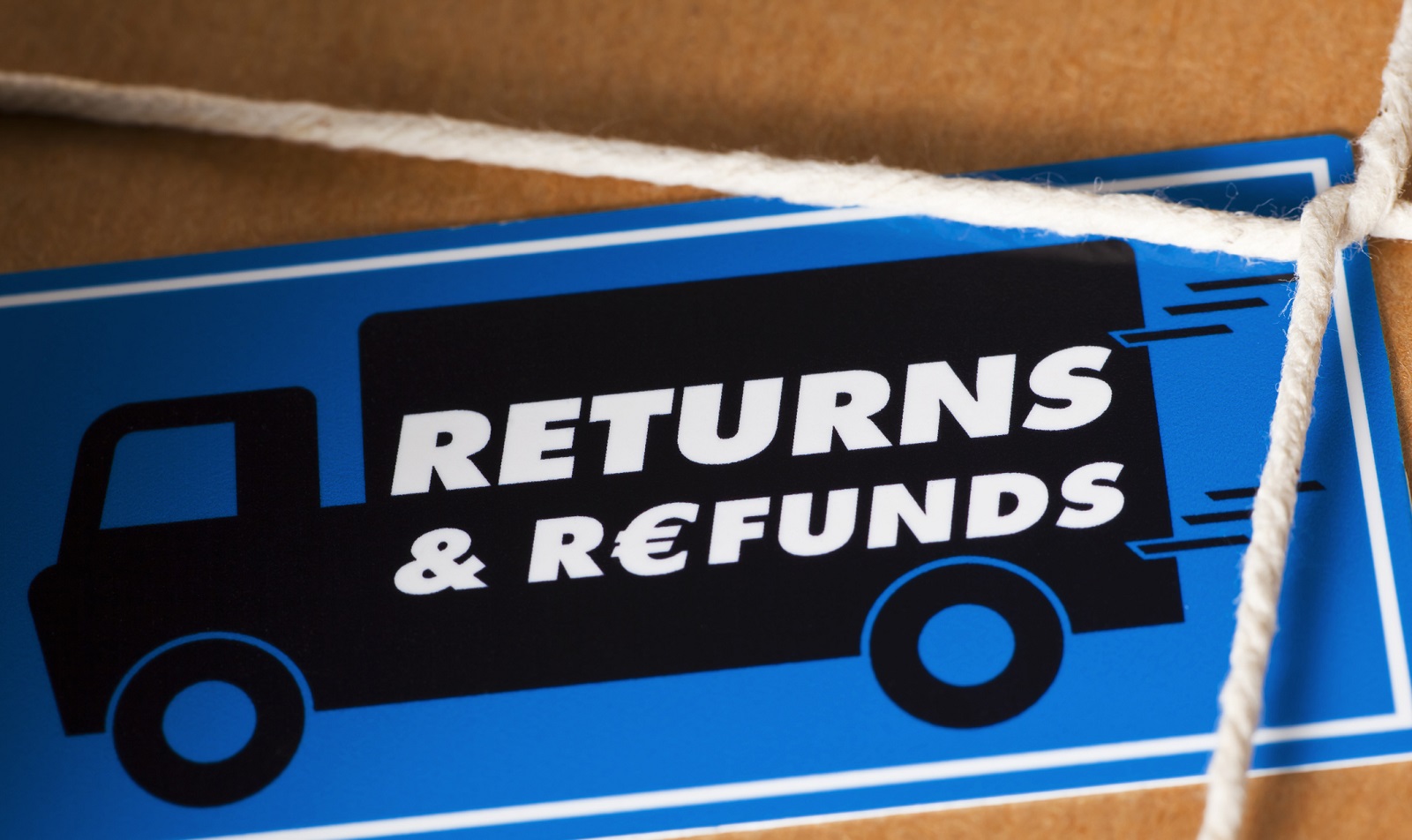Have A Return? Retail Fraudsters Are Making That More Difficult
A new twist in shopping — return fraud — has some retailers clamping down on policies.


Profit and prosper with the best of Kiplinger's advice on investing, taxes, retirement, personal finance and much more. Delivered daily. Enter your email in the box and click Sign Me Up.
You are now subscribed
Your newsletter sign-up was successful
Want to add more newsletters?

Delivered daily
Kiplinger Today
Profit and prosper with the best of Kiplinger's advice on investing, taxes, retirement, personal finance and much more delivered daily. Smart money moves start here.

Sent five days a week
Kiplinger A Step Ahead
Get practical help to make better financial decisions in your everyday life, from spending to savings on top deals.

Delivered daily
Kiplinger Closing Bell
Get today's biggest financial and investing headlines delivered to your inbox every day the U.S. stock market is open.

Sent twice a week
Kiplinger Adviser Intel
Financial pros across the country share best practices and fresh tactics to preserve and grow your wealth.

Delivered weekly
Kiplinger Tax Tips
Trim your federal and state tax bills with practical tax-planning and tax-cutting strategies.

Sent twice a week
Kiplinger Retirement Tips
Your twice-a-week guide to planning and enjoying a financially secure and richly rewarding retirement

Sent bimonthly.
Kiplinger Adviser Angle
Insights for advisers, wealth managers and other financial professionals.

Sent twice a week
Kiplinger Investing Weekly
Your twice-a-week roundup of promising stocks, funds, companies and industries you should consider, ones you should avoid, and why.

Sent weekly for six weeks
Kiplinger Invest for Retirement
Your step-by-step six-part series on how to invest for retirement, from devising a successful strategy to exactly which investments to choose.
While you may notice that some stores are letting you keep your returns under so-called "keep it" policies that help them defray costs, others are beginning to crack down on those very same return policies.
Why? Two words: Return Fraud.
Retailers are projecting that, in the aftermath of the 2023 holiday season, fraudulent returns will account for $24.5 billion of the $148 billion total worth of returns, according to a January 29 CNBC report,
From just $107.88 $24.99 for Kiplinger Personal Finance
Become a smarter, better informed investor. Subscribe from just $107.88 $24.99, plus get up to 4 Special Issues

Sign up for Kiplinger’s Free Newsletters
Profit and prosper with the best of expert advice on investing, taxes, retirement, personal finance and more - straight to your e-mail.
Profit and prosper with the best of expert advice - straight to your e-mail.
As Kiplinger previously reported, when an item is low-cost or does not make economical sense for a person to return, many retailers will issue a refund and allow the customer to keep the item.
But online shopping has fueled an increase of people taking advantage of these new cost-saving measures. According to the CNBC report, some fraudulent shoppers lodge complaints about merchandise never being received and others return stolen goods or send back a totally different item altogether.
The news comes as both in-store and online 2023 holiday retail sales were better than expected, with studies showing that consumer spending last month still had momentum, as Kiplinger’s latest Retail Outlook report shows. Online sales, for example, rose 1.5%, while in-store sales grew 0.4%, thanks in part to a whopping 3% spending increase at department stores and 1.5% increase at clothing stores.
Will it last?
According to a Business Insider report last November, the practice of reporting items as missing or damaged goods, in particular, costs major retailers such as Walmart and Amazon millions. In one incident noted in the report, a crime ring banded together to falsely start refunds or returns on the completed online orders of shoppers.
Schemes like that may be behind why some retailers have clamped down when it comes to return policies.
According to a 2023 holiday forecast by returns management platform goTRG, a growing number of retailers were planning to shorten their return windows and some were implementing return fees for the first time in a year. The report linked the actions to the need for retailers to maintain profitability and offer competitive prices.
But making returns harder on shoppers could be a fleeting approach as analyst Sucharita Kodali told NPR in December 2023 report.
“I don't see strict return policies lasting for that long. It's a pendulum that swings back and forth," Kodali told NPR. "It depends on economic sentiment, consumer confidence, whether or not the retailer is financially well-positioned or not, how much inventory they have in stock, etcetera, etcetera."
While most holiday return windows have already come and gone, it may be worth brushing up on some of the major retailers’ return guidelines and policies for your next shopping trip.
From one store to another, policies and procedures — besides the length of time that you're given to make a return — can differ.
For example: Costco shoppers can return items at any time, while Target Red Card holders are given an additional 30 days to return items on top of its regular return policy. Nordstrom, on the other hand, has no time limits, but only accepts returns on a “case-by-case basis.”
RELATED CONTENT
Profit and prosper with the best of Kiplinger's advice on investing, taxes, retirement, personal finance and much more. Delivered daily. Enter your email in the box and click Sign Me Up.

Jamie Feldman is a journalist, essayist and content creator. After building a byline as a lifestyle editor for HuffPost, her articles and editorials have since appeared in Cosmopolitan, Betches, Nylon, Bustle, Parade, and Well+Good. Her journey out of credit card debt, which she chronicles on TikTok, has amassed a loyal social media following. Her story has been featured in Fortune, Business Insider and on The Today Show, NBC Nightly News, CBS News, and NPR. She is currently producing a podcast on the same topic and living in Brooklyn, New York.
-
 Quiz: Do You Know How to Avoid the "Medigap Trap?"
Quiz: Do You Know How to Avoid the "Medigap Trap?"Quiz Test your basic knowledge of the "Medigap Trap" in our quick quiz.
-
 5 Top Tax-Efficient Mutual Funds for Smarter Investing
5 Top Tax-Efficient Mutual Funds for Smarter InvestingMutual funds are many things, but "tax-friendly" usually isn't one of them. These are the exceptions.
-
 AI Sparks Existential Crisis for Software Stocks
AI Sparks Existential Crisis for Software StocksThe Kiplinger Letter Fears that SaaS subscription software could be rendered obsolete by artificial intelligence make investors jittery.
-
 One of the Most Powerful Wealth-Building Moves a Woman Can Make: A Midcareer Pivot
One of the Most Powerful Wealth-Building Moves a Woman Can Make: A Midcareer PivotIf it feels like you can't sustain what you're doing for the next 20 years, it's time for an honest look at what's draining you and what energizes you.
-
 I'm a Wealth Adviser Obsessed With Mahjong: Here Are 8 Ways It Can Teach Us How to Manage Our Money
I'm a Wealth Adviser Obsessed With Mahjong: Here Are 8 Ways It Can Teach Us How to Manage Our MoneyThis increasingly popular Chinese game can teach us not only how to help manage our money but also how important it is to connect with other people.
-
 Looking for a Financial Book That Won't Put Your Young Adult to Sleep? This One Makes 'Cents'
Looking for a Financial Book That Won't Put Your Young Adult to Sleep? This One Makes 'Cents'"Wealth Your Way" by Cosmo DeStefano offers a highly accessible guide for young adults and their parents on building wealth through simple, consistent habits.
-
 My Spouse and I Are Saving Money for a Down Payment on a House. Which Savings Account is the Best Way to Reach Our Goal?
My Spouse and I Are Saving Money for a Down Payment on a House. Which Savings Account is the Best Way to Reach Our Goal?Learn how timing matters when it comes to choosing the right account.
-
 We're 78 and Want to Use Our 2026 RMD to Treat Our Kids and Grandkids to a Vacation. How Should We Approach This?
We're 78 and Want to Use Our 2026 RMD to Treat Our Kids and Grandkids to a Vacation. How Should We Approach This?An extended family vacation can be a fun and bonding experience if planned well. Here are tips from travel experts.
-
 My First $1 Million: Retired From Real Estate, 75, San Francisco
My First $1 Million: Retired From Real Estate, 75, San FranciscoEver wonder how someone who's made a million dollars or more did it? Kiplinger's My First $1 Million series uncovers the answers.
-
 To Love, Honor and Make Financial Decisions as Equal Partners
To Love, Honor and Make Financial Decisions as Equal PartnersEnsuring both partners are engaged in financial decisions isn't just about fairness — it's a risk-management strategy that protects against costly crises.
-
 Top 5 Career Lessons From the 2026 Winter Olympics (So Far)
Top 5 Career Lessons From the 2026 Winter Olympics (So Far)Five lessons to learn from the 2026 Winter Olympics for your career and finances.